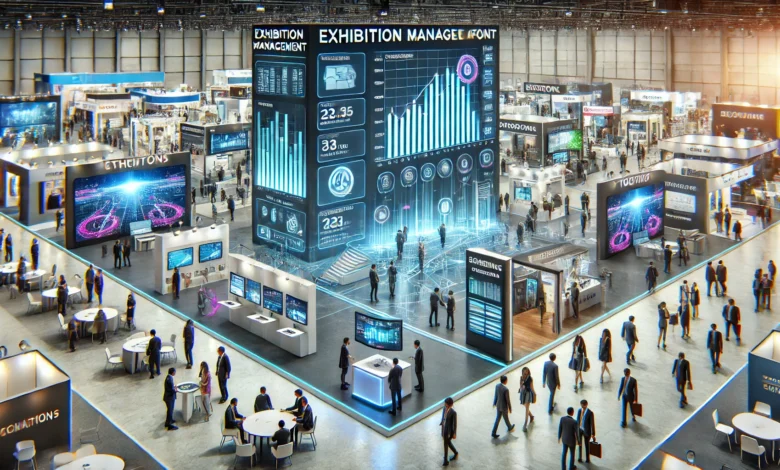
As events like exhibitions and trade shows are considered hot spots in a fast-moving world, making it efficient is important to guarantee that everything runs conveniently with the organized event so that it can maximize its value. To a huge extent, from coordinating exhibitors through exhibitor registration and management to various logistics issues and real-time data, such massive events require streamlined operations. This is where an exhibition management platform helps.
The exhibition management platform is, in fact, a golden opportunity for SaaS providers to bring an end to the age-old tradition of the way events happen. Providing a streamlined window for a set of tools and features, these platforms would allow organizers to achieve automating diverse tasks, enhance communication, and gain maximum efficiency at every step in the process of organizing an event. Some of the ways through which an exhibition management platform can mark a huge difference in operational efficiency and contribute towards the success of any event are as follows:
1. Centralised Planning and Coordination
One of the greatest advantages when using an exhibition management platform is that it allows for the centralization of all aspects of event planning and coordination in one interface. In contrast, organizing an exhibition the traditional way requires teams to juggle multiple spreadsheets, emails, and software tools to manage logistics, schedules, and exhibitor information—a very fragmented approach that can easily lead to inefficiencies and miscommunication.
This brings all these elements into focus through an exhibition management platform. From a single dashboard, event organizers are able to monitor booth assignments, schedule meetings, and respond to exhibitor requests in real-time. Beyond preventing mistakes, it ensures that everyone on the team is singing from the same page. With streamlined communication and the ability to make changes rapidly, organizers can swing into action in response to changes, keeping the event running according to plan.
2. Automated Registration and ticketing:
An exhibition may often involve the process of registration of attendees; this can be a resource-intensive task depending on the size of the exhibition. The traditional means of registration can be achieved through manual data entry, which causes errors as well as a time lag in the handling of registration. The entire process of registration is automated and not cumbersome within an exhibition management platform.
These technologies allow attendees to register and purchase tickets online. Online registration and ticketing may now easily be accessed through the event’s website or mobile application through quick sign-up and buying of tickets. The necessary attendee data automatically gets collected, and no manual typing of information is involved. Registration processes are thus minimized by reducing administrative workload and probable errors in registration details.
Automated ticketing systems can also send confirmations of attendance or updates on an event to attendees as soon as it occurs, making them well-informed at the pre-event stage. All these efficiencies in managing registration further enhance the experience of attendees and give more time to organizers for other time-critical activities.
3. Real-Time Data and Analytics
Most successful exhibitions depend on data-informed choices, so exhibition management platforms need to have analytical and reporting tools that can give real-time information about different aspects of the event. It tracks from attendee engagement to exhibitor performance, thereby giving organizers the power to make decisions before, during, and after the event.
For example, organizers can use these tools in order to analyze what booths attracted more foot traffic or which sessions had the most-attended. In turn, they will be able to make on-the-fly adjustments in order to make the experience better for attendees or give exhibitors the sort of feedback they require.
Another advantage of post-event analytics is that it will enable event organizers to determine the overall success of the event while pointing out areas for improvement. The reports made available by the platform can ensure that event organizers have access to the critical information they require to fine-tune their strategies for the next exhibition.
4. Ingestion of Exhibitor and Attendee Engagement
Keeping the exhibitors and attendees engaged throughout the event is crucial for the success of an exhibition. Exhibition management platforms offer various tools to enhance engagement, be it matchmaking or a mobile event app.
The exhibitor, through the platform, can easily manage booth setup, request additional services, and track leads generated during the event. With this control, the chances of returning to the same exhibition time and again are highly possible.
For the attendee side of things, networking features may be included through attendee matchmaking, which implies relevant exhibitors or sessions for the interested person. It maximizes attendee experience and engagement with the event. Other features, live polls and interactive Q&A, engaged attendees as well as helped to establish community throughout the exhibition.
5. Simplified Logistics and Management of Vendors
Perhaps the most challenging task in exhibition organization is logistics. The entire process-from management of vendors working on different aspects to the supply of equipment-can fast become overwhelming without the right tools in place.
A further benefit the exhibition management platform provides is streamlined vendor management via a digital space where organizers can communicate and track their vendors. Such features as inventory tracking, service request management, and timeline management-through which everything can be managed within the platform-and makes it easier for coordinators to manage and synchronise the arrival and setting up of all that is necessary, including equipment, catering, and everything else, thus ensuring everything goes by the clock.
This also ensures that there is always real-time updating of the changes made in logistics, and every vendor receives this information immediately; thereby cutting down the risks of delay or miscommunication. These logistics management websites help streamline all aspects of event management, ensuring all sectors are performed with a healthy level of efficiency and on time.
6. Reduced Administrative Costs
Although the initial investment may seem heavy, long-term savings could be substantial. These platforms reduce the amount of additional administrative staff required because they automate many of the familiar manual processes event planners must perform, including registration matters, data entry, and even communication.
Finally, the productivity gained from the central management process plus real-time tracking eliminates the chance of costly errors, like double booking or scheduling. The ability to accomplish multiple tasks with fewer resources surely translates to big savings thus making the platform an inexpensive option for managing exhibitions.
Furthermore, the online solution saves participants on printing and paper costs through alternative methods for materials such as an exhibitor directory and interactive event apps that further benefit overall cost-effectiveness.
7. Follow-up after the event
The post-event phase is as important as the event itself; such an opportunity is offered to internalize relationships with attendees and exhibitors while gathering valuable feedback. Exhibition management platforms support follow-up activities through automated surveys, email marketing, and lead management tools.
The lead management system tracks every activity on the show floor, which would allow for further follow-up communications on exhibitor leads, helping them to convert them into real business. This, of course, leads to improving their overall ROI from the event.
To the attendees, it can automatically send an automated post-event survey to be completed by them for feedback on the content of the event, the organization leading to the event, and overall experience.
It would be great for those organizing to have insights on how best to plan future events so that they meet the needs and expectations of their audience.
Final Review
Exhibition management platforms are one comprehensive solution to all the problems related to organizing and executing mass events. These systems can centralize, automate, and maintain real-time insights into operations; this will improve the efficiency of organizers and also deliver an easy experience for exhibitors as well as attendees.
For SaaS companies, this opportunity to build and offer exhibition management platforms will be an opportunity cherished as a potential answer to the increasing demand by the event industry for more high-tech solutions. These evolving landscapes will define the same roles that exhibition platforms will help organizers maintain their competitive advantage, increase operational efficiency, and deliver memorable events.




